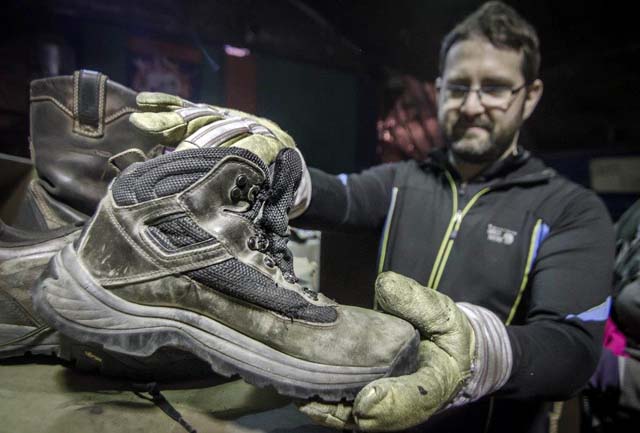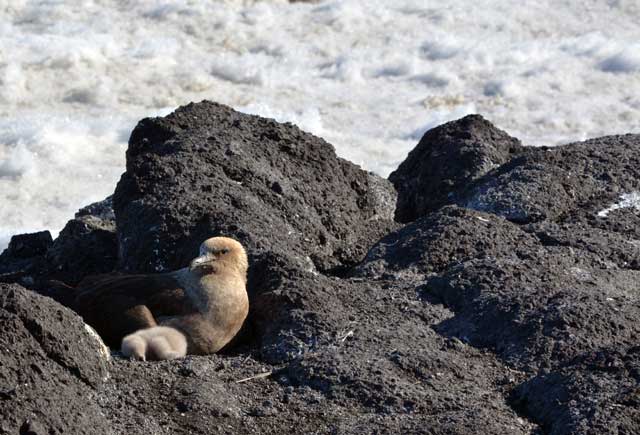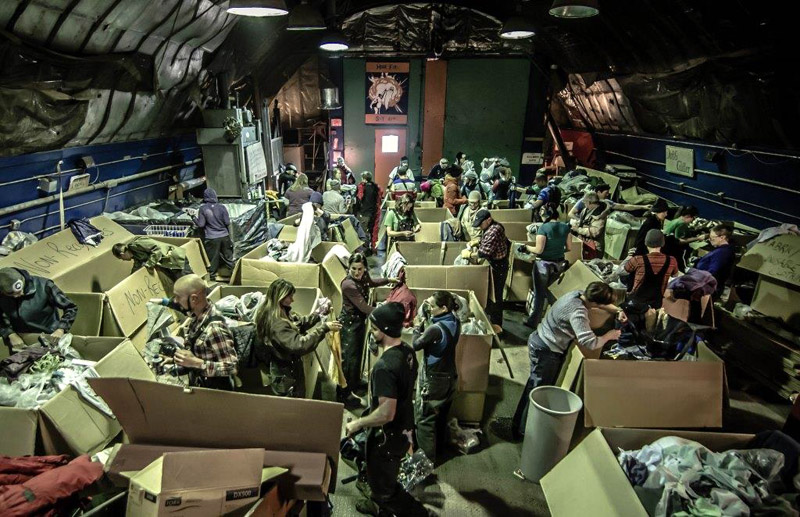Sorting it outMcMurdo residents find second-hand treasures while cleaning up stationPosted April 6, 2015
“Hey, that was mine!” exclaimed Travis Groh, Waste Management supervisor, as he spied a blue-and-white striped hooded sweatshirt being pulled out of a box. He brought the garment to the Ice more than three years ago, and he was pleased to see it turn back up in skua. A scavenger bird of the Antarctic, skua is also the adopted name for the collection of miscellaneous items that U. S. Antarctic Program (USAP) participants leave behind for use by current and future residents. Skua 101 Noun: the world’s southernmost flying bird and a relentless hunter. Noun: the adopted name for the collection of miscellaneous items that USAP participants leave behind for use by current and future residents. Verb: to put in or receive an item from the skua recycling system. "I skuaed that last year." "I’m skuaing this shirt." Adjective: describing an item that was acquired from the skua system. "This is my favorite skua shirt." "This is a skua hat." More than a thousand USAP participants pass through McMurdo Station during an austral summer season, so the collection of available skua is never greater than at the beginning of the winter, just after the summer flights conclude and the population is pared down almost six-fold. Groh, his fellow waste department staff and about 50 volunteers gathered in the Waste Operations work center last month to sort, evaluate and, of course, claim various goods. This year, there were more 600 cubic feet of skua piled into 16 large cardboard boxes. The volunteers eagerly pulled on work gloves in anticipation of the opportunity to dig for skua treasures. As an upbeat playlist sounded from the background, they began rifling through the open boxes. The skua sorting party was underway. What followed was high-energy, organized chaos. Items were passed from person to person and names were shouted across the room as people sized up and identified potential owners of high-quality, reusable boots, base-layers, coats, hats, gloves, costume pieces, sauces, spices, teas, electronics, decorations, toys, books, and even home furnishings. Unclaimed quality items were placed back in boxes for future residents. Skua is a primary way for USAP participants who operate and maintain this remote, frigid town at the end of the world to acquire personal effects. “I found some new running shoes, so my workouts have been going better,” said work order scheduler Rebekah Osgood. “I also found two bars of chocolate. Personally, that might be the highlight of the event.” 
Photo Credit: Kira Morris
Senior materialsperson Joseph Singleton organizes work boots left behind by summer staff.
McMurdo and the other stations boast a strong recycling culture, where people take the idea of conservation seriously, with the USAP recycling at least 60 percent of its waste. Skua is just one manifestation of that culture, acting as an internal materials recycling system that significantly reduces the volume of items that might otherwise have ended up in landfills back in the United States. “We went from 16 boxes of unsorted goods, to eight boxes of good skua,” Groh reported after the event. This means half the items that might otherwise have become waste were identified as potential candidates for reuse. The rest either went home with the volunteers or deemed rubbish. From the standpoint of most of the volunteers, however, the value of skua is found in the objects themselves. “I found a water-filtering pitcher complete with three replacement filters,” said senior materialsperson Joseph Singleton. While the drinking water at McMurdo is of high quality, Singleton was excited to have a filtered pitcher to keep cold water in his dormitory refrigerator. “I found a few books, a Finding Nemo hat, and a box I put in skua last year that I use as a table for doing crossword puzzles in my room,” said Kyle Morrison, the station’s network engineer. Morrison, like Groh, has worked here enough seasons to see some of her own skua being recycled, or even to reclaim it again for herself. 
Photo Credit: Peter Rejcek/Antarctic Photo Library
Don't let this scene of domesticity fool you: The skua is a relentless, if beloved, scavenger seabird of Antarctica.
A couple participants good-naturedly haggled over a set of costume elf ears while others held up unusual decorative pieces, imagining how they might look in their rooms. In this way, skua is also a manifestation of the unbridled creativity of McMurdo residents and helps define the culture of the small town. “I found an Antarctic skirt a friend of mine made years ago for McMurdo’s craft fair. I always wanted one. So, I was excited not only to find the exact thing I wanted but also to see something made by a past winter friend,” said research associate Elizabeth Widen. Skua party scores tended toward a mix between the practical and fun, the risqué and the ridiculous. Santa hats, Valley Doll hot sauce from the Virgin Islands, Christmas lights, a Teenage Mutant Ninja Turtle laundry basket, and SmartWool socks were among the cache of claimed treasures this year. “Each year, our boss puts this flamingo hat back into skua. Then we find it and give it back to him when he returns for summer,” said a smiling Natalie Brechtel, a fuels operator who is wintering over at McMurdo this year. “It’s become a tradition, an ongoing joke.” Life on the seventh continent can be tough. This may be especially true in winter, as the light recedes and the temperatures drop. But the act of skua-ing, whether one gives or receives, is a kindness that USAP participants pay to one another. Finding a small slice of home in a decorative basket, donning a jacket worn by a friend from a previous season or noticing someone find joy in an object you no longer need, are all ways that residents bond in a place often devoid of comforts, on a cold island, far far from home. |



For USAP Participants |
For The Public |
For Researchers and EducatorsContact UsU.S. National Science FoundationOffice of Polar Programs Geosciences Directorate 2415 Eisenhower Avenue, Suite W7100 Alexandria, VA 22314 Sign up for the NSF Office of Polar Programs newsletter and events. Feedback Form |


